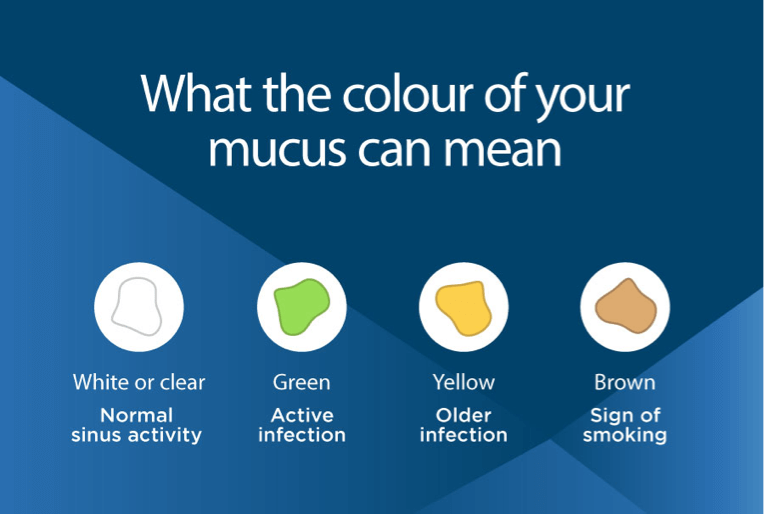
If you develop a mucus cough, you may feel uncomfortable and concerned. Try not to worry, though, as coughing is simply a reflex action that helps clear your airways. Some types of coughs are unproductive – meaning they’re dry and no phlegm is produced – but mucus coughs are productive, as they help to remove mucus.
While mucus is unpleasant, everyone has it and it serves an important purpose. Mucus contains antibodies that help our bodies recognise viruses and bacteria. It also features protein and enzymes that help make your body inhospitable to these invaders.
It’s normal to produce mucus. When you’re healthy, your body makes approximately 1 to 1.5 litres of it a day. Most of it trickles down your throat without you noticing. But certain illnesses and conditions can lead to an overproduction of the substance or a change in its consistency, causing you to cough up mucus.
This guide will take you through the symptoms, causes, and the different ways you can treat a mucus cough.
What is a mucus cough?
When you have a mucus cough, your coughing can feel wet. One of the main symptoms of a mucus cough is producing mucus or phlegm. The mucus your body produces can vary in colour, which may indicate the cause of the cough.
Please note that some conditions can produce mucus in multiple colours. For example, pneumonia may produce yellow, green, brown or blood-stained mucus. Therefore, other symptoms should also be considered when determining the cause of your mucus cough.
White mucus cough
Coughing up white or clear phlegm is usually a sign of normal sinus activity or congestion. Small amounts could also suggest asthma. If you’re coughing up white or clear, foamy mucus, it can indicate fluid in the lungs. It’s important to keep an eye on this if you suffer from swollen hands or feet or are on water tablets.
Please contact your doctor if you are concerned
Green mucus cough
Coughing any shade of green phlegm can indicate that the body is fighting an active infection. Green mucus is caused by a green-coloured protein released by your white blood cells. These cells are produced in response to:
Foreign bodies
Viruses
Bacteria
Pollutants
Dirt
Pollen
Microbes.
Yellow mucus cough
Coughing up yellow phlegm in any shade may signal that the body is fighting a mild or old infection. Be aware that an old infection may become active eventually if it isn’t fully cured. Yellow phlegm can also be a symptom of pneumonia.
Brown mucus cough
A brown mucus cough is most common in smokers or people who have recently quit smoking. It can also be a symptom of pneumonia.
You should speak to a doctor if you’re concerned about your mucus production.
What causes a mucus cough?
There are many reasons people can have mucus coughs, and some symptoms can suggest you need medical treatment. Some of the most likely causes for coughing up phlegm include:
Cold, flu and other upper respiratory tract infections (URTIs)
These are the most common reasons for coughing. Viruses cause colds and coughs because the body is trying to get rid of mucus full of germs. You can ease symptoms with over-the-counter (OTC) medicines, but there is no known cure.
If your body aches in addition to coughing, you may have flu or another upper respiratory tract infection. OTC treatments such as Benylin® can relieve symptoms, but you may also want to consider a yearly flu vaccine.
Allergies, such as hay fever
Cough symptoms can be caused by allergies, including mucus coughs. Any reaction involving the lungs is usually a reaction to something airborne, such as dust mites or pollen.
Asthma
The symptoms of asthma can include coughing up phlegm, shortness of breath, and a tight chest. Your airways may become inflamed, but small amounts of white or clear phlegm are normal.
Chronic obstructive pulmonary disease (COPD)
Breathing becomes increasingly difficult over time with COPD, with most sufferers not aware of the symptoms until they’re in their late-40s or 50s. Common symptoms include a persistent chesty cough with phlegm that doesn’t go away.
Cystic fibrosis
This is an inherited condition in which the digestive system and lungs become clogged with a sticky, thick mucus. Cystic fibrosis can cause digestion and breathing issues from a young age. Over time, the lungs can become so damaged that they stop working correctly.
How to get rid of a common mucus cough
Usually, a mucus cough will clear after around three or four weeks. But, if you’re struggling with your symptoms, there are many ways to help manage a mucus cough at home:
Stay hydrated – drinking plenty of fluids will help.
Get lots of rest – give your body a chance to recuperate.
Minimise contact with others – especially if you have a high temperature or don’t feel well enough to do regular activities.
Use OTC medication – take ibuprofen and paracetamol as needed.
Avoid irritants and smoke – this will help to reduce the amount of coughing.
Your pharmacist may recommend some OTC remedies as a mucus cough treatment. These can include expectorants, which help thin mucus and makes it easier for the body to get rid of.
Benylin® Mucus Cough Max Honey & Lemon Flavour Syrup and Benylin® Mucus Cough Menthol contain the expectorant guaifenesin as an active ingredient to loosen the mucus in your chest, . This causes blood vessels in the sinuses and nasal passages to narrow and contract, reducing congestion.
Our Mucus Cough Night medicine features guaifenesin, plus diphenhydramine, an antihistamine that treats coughs. Diphenhydramine can cause drowsiness, which may help if your cough has been impacting your sleep. It also features levomenthol, which has mild cooling and decongestant properties to help soothe coughs.
If you prefer tablets, try Benylin® Mucus Cough & Cold All in One Relief Tablets. They contain guaifenesin, paracetamol to relieve pain and reduce temperature, and the nasal decongestant phenylephrine, which reduces swelling in the nasal passages and the production of mucus.
